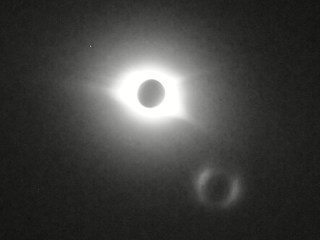The actual eclipse started before I bothered to get out there with my camera. Having said that I was set up and photographing before and during totality. One of my first shots was just a plain ordinary photo of the sun. The moon was taking a bite out of the sun in the first photo but it didn't show up too well.
In the next photo, I tried going to manual mode from iAuto and underexposed a little. The crescent of the moon cutting into the sun didn't show up at all. It's not a bad photograph though.
Next, I pulled off the mylar sunglasses that my girlfriend had given me to view the sun and put one eyepiece over the lens. That worked well. It's possible to see clearly that a bite has been taken out of the sun. In retrospect I would have liked to zoom in and take another photo but I'll have to wait 70 years for the next solar eclipse in Columbia, South Carolina or go to one of the other locations. I gather there are solar eclipses fairly regularly across the world. The next full eclipse is either 2025 or 2026.
Having taken a photo like that, the moon ate more of the sun to such an extent that it became really quite dim though not dark. The sky did not turn black as I'd thought it might have. To be honest, the first eclipse I was when I was a very small child. The next was in the years 1990-2005 though I can't recall exactly which year. I'd been living in Britain and the BBC had droned on so much about the eclipse that I was thoroughly tired of it by the time it eventually turned up. Thus, I didn't pay too much attention. I looked and noted it was dark outside but that was all.
Suddently totality happened. Clearly having a polarizing filter on the lens didn't help as evidenced by the reflection of the sun with the moon in front on the front element. It was rather interesting to see everything go darker and rather unique to see light levels that low without any afternoon or morning color cast.
Looking at the photo I realise that using iAuto I had achieved my goal. The stars are visible in the photo or at least some of the brighter ones are. There are a couple to the right that appear as single red pixels. Those are not hot or stuck pixels - they're real planets.
Enlarging the central portion of the photo it's possible to see a star just above and to the left of the eclipsed sun. For those of a technical disposition, the exposure was 1.3 seconds, f5.6 at ISO 200. Bang went my theory about exposing for 5 seconds at ISO 1600 and f3.5. iAuto saw to that and came up with the goods. Now I've heard a lot of bunk about iAuto and auto this and auto that but honestly, it does seem to make photography easier and makes for better images.
Does anybody remember the old days when nobody used a light meter? I do. I used not to have a light meter on my camera. I used to have to gauge exposure by ambient light. In fact a neighbor and I used to call out exposures then check them on a light meter. We were rarely if ever wrong. Then in came light meters which eliminated bad light estimation. Then came auto exposure which eliminated dark or light photos. Then in came auto-focus which eliminated out of focus images. Then came digital and intelligent programming.
Given that even the average phone is a splendid camera, I'm highly unsurprised to find most people now take photos with their phones and that professional photographers are finding it harder than ever to sell their snake oil. I see adverts by expensive wedding photographers and wonder who is ever dumb enough to fall for that one. Heck, if they''re dumb enough to pay for photography when their friends cell phone images will be of excellent quality and shared on facebook within seconds then I've got a bridge to sell. That's if you don't prefer to buy blinker fluid or need your car radiator flushed.
So, will I be at the next solar eclipse? I cannot say definitely that I won't though I find the idea unlikely. On the other hand I never ever thought I'd have made the journey from the United Kingdom to the United States of America nor that I'd end up living here. Stranger things clearly having already happened, I might indeed be at the next total solar eclipse. That's going to be either Chili or Argentina on July 2nd, 2019. That would be my mother's 88th birthday had she not passed away last year. Perhaps that's a message from beyond telling me to be there?






No comments:
Post a Comment